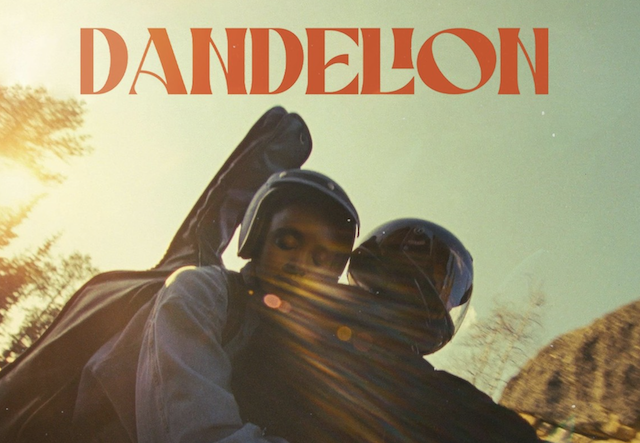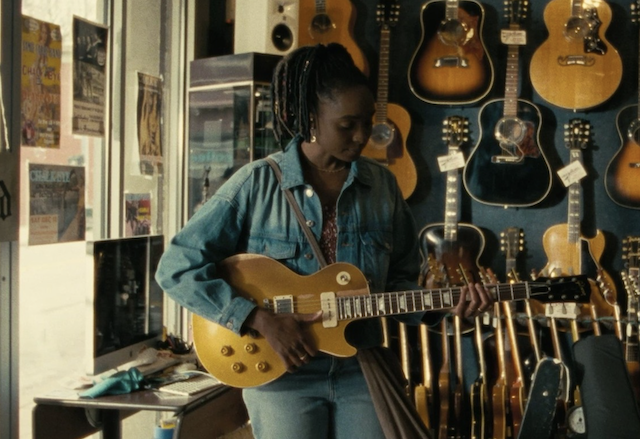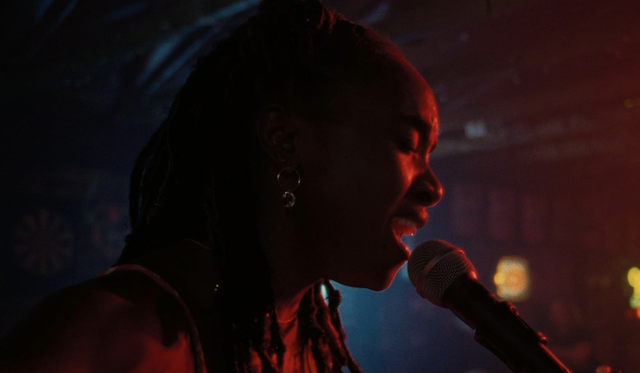
@Courtesy of IFC Films
Q : Music is so important in this movie? Is there some kind of music or a song that inspired you in real life?
Thomas Doherty: I grew up doing a lot of musical theatre. And so It was a sign. Every single day you hear a piece of music. And it can determine certain moods. It always makes me want to move, always makes me want to dance. Music gives energy and positivity to my everyday life.
KiKi Layne: Music is such a personal thing in one person’s life., I can’t think of a specific song, I love music so much. To me there’s a playlist for everything: working out, crying, being mad at somebody. There are feelings I need to take out through a song instead of keeping them within. You just gotta find the song for the moment.
Q : Can you talk about the music inspirations for the films specifically? Where is that sort of spirit of the music coming from?
KiKi Layne: One artist I looked to as I was preparing is Joy Oladokun, then Lauren Hill, Tracy Chapman. I looked for black women playing guitar, playing around in genres that aren’t the stereotypical, genres that when people think of a black music artist that they like to dump us into. I tried finding inspiration there and then also checking in with myself, my own personal influences. I had to ask myself what influences could make sense for this character. Some sides of Dandelion are different, others are similar between me and Dandelion, so I had to be mindful. I just tried to find other black women who are making great music but maybe not getting all of the recognition that they deserve.
Thomas Doherty: I was raised inside the Celtic culture, Ireland and Scotland. They’re quite suppressed nations. I don’t know if you’ve heard of the tall poppy syndrome. It’s basically: don’t be the tallest poppy in the field, otherwise you get cut down. That’s kind of the mentality, and that’s why I had to leave,it felt so heavy, I had to get out and America is a fantastic place to try to be a tall poppy. The way that they channel that energy is through folk music. Because of that, it’s so rich, there’s a density to it which is really powerful. A lot of music there is about revolution and breaking free.

@Courtesy of IFC Films
Q : How did you work in order to connect with your own character through the music you were playing?
KiKi Layne: That was the crucial part. Some of the first conversations that I had with the director Nicole Riegel, I had to talk to her about the fact that this music is supposed to be written by Dandelion, it’s supposed to come from her life, her experiences. Our composers, Aaron and Bryce Dessner, they are incredible but they’re two white men in their mid forties, while Dandelion is now being played by a 30 year old black woman.
So we had to discuss the disconnect that was there, and how Dandelion might express herself versus what the Dessners were writing. That was a big part of my process, just pouring more of myself into the music. And I’m grateful that Nicole and the Dessners gave me the opportunity to do that. So that’s how the song Over the Rhine came to be.
I’m also from Cincinnati, that’s a very personal song for me about a predominantly black area over the Rhine that has been gentrified in recent years. Even the song River rhythmically and melodically was very different, I had to bring more of myself just to honor the truth of Dandelion.
Thomas Doherty: You guys won’t know, you haven’t seen it, but KiKi from the first day to the last day of shooting, she really changed her own music. She put so much hard work into Dandelion made the movie her own
Q : There’s really a serious conversation in the film about the gap that’s growing between capitalism and art…
KiKi Layne: That’s the battle of making great art and making art that maybe is more commercial, the thing to do to get likes and listens and followers. IThat’s a real battle. As an actorI struggle with that. And that’s why I was able to connect so deeply with this character. I want to tell great stories, and sometimes that’s not really what is happening. It’s frustrating.
Sometimes it feels like my ability to do the things that I want to do is being reduced to how many followers I have on Instagram, as if that is representative of my talent and the things that I’m capable of doing. We really see Dandelion struggling with those things and I think it’s something that a lot of artists are wrestling with right now, wanting to do things a certain way, but not seeing that being celebrated and not seeing that translate into money, into growth, whatever it may be.
So what am I supposed to be? Inauthentic to get to that higher place? Is that the sacrifice I have to make? Is it worth it? It’s a real battle. I think all of us, me, Thomas, Nicole, really poured our struggles with that into this project. Pretty much art is becoming inaccessible to poor folks. And in the film, you know, it’s understandable that Dandelion, you know, the character is a very blue collar. And as art becomes more inaccessible, it gets away from people, so now people are making major sacrifices for art.

@Courtesy of IFC Films
Q : How do we make it more accessible again so that people feel comfortable?
Thomas Doherty: Taking a journey like Dandelion and taking journeys and sacrificing to get what they want to achieve, I don’t think you can. I think it’s just black and white. I’m sure there’s a bunch of artists, actors that do believe in and do indulge in the idea, but at the end of the day, iit’s just not the reality of life. So I guess it’s a case of trying to find a healthy balance.
KiKi Layne: I don’t think it’ll ever be that. In some ways, art has become more accessible. If you think about how you are able today to have access to music from different parts of the world, different languages, thanks to the internet and social media and all of that. So in some ways it’s really opened us up, but I think it made it smaller. What type of art is lifted up? What type of art keeps getting put into your face? What type of art does the algorithm prioritize? That starts to get frustrating. If I go digging into Spotify, I’m like: “There’s so much great music out there. Why don’t I ever hear about these people?” So with music, I feel like there’s a certain level of accessibility.
Q : Last thing I want to know about is Dandelion’s look. There’s a natural textured look to her. Did you have a hand in figuring out what Dandelion would look like and what natural would be for the character?
KiKi Layne: Absolutely. I had several conversations with hair, makeup, costumes. I find those things to be so important. They’re a direct reflection of who these people are, what they’re comfortable with, how they like to be seen. Those details are so important especially with this film because we see her scrolling through Instagram.
You got the half naked girls, you got the girls with the super beat face, hair down to the ankles. And she’s kind of like: “Damn, is that that’s what I have to do to get seen? That’s what I have to do to be heard?” So it’s important for me as a black woman in film to make sure that when other black women see me like that, they see themselves.
That started with me with If Beale Street Could Talk. That was my natural hair, I really didn’t have much makeup in that film. Unless it makes sense for the character, I’m not doing that, you gotta honor the character first. We just gotta honor these characters, no matter what we might have going on in our real lives.
If you like the article, share your thoughts below.
Check out more of Adriano’s articles.
Here’s the trailer of Dandelion

